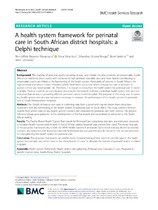A health system framework for perinatal care in South African district hospitals: A Delphi technique
Date
2019Author
Nkwanyana, Ntombifikile Maureen
Voce, Anna Silvia
Mnqayi, Sthandwa Octavia
Sartorius, Benn
Schneider, Helen
Metadata
Show full item recordAbstract
The majority of perinatal deaths occurring in low- and middle- income countries are preventable. South Africa is a middle-income country with consistently high perinatal mortality rates and most factors contributing to preventable deaths are linked to the functioning of the health system. Particularly of concern in South Africa is the high perinatal mortality in district hospitals, where most births occur and where intrapartum care is provided to women of low and intermediate risk. Therefore, it is crucial to strengthen the health system for perinatal care in district hospitals. There is currently no consolidated documented framework outlining contextual health system domains and indicators that are key to providing effective perinatal care in district hospitals. The purpose of this study was to derive key health system domains and indicators necessary to measure the performance of the health system for perinatal care in South African district hospitals. Methods: The Delphi technique was used in collecting data from a panel with experts drawn from disciplines connected with the functioning of the health system for perinatal care in South Africa. The study enrolled thirteen experts from whom data on key health system domains and indicators for perinatal care were derived. The project reference group gave guidance to the development of the framework and ascertained its relevance to the South African setting. Results: The Facility Based Health System Framework for Perinatal Care comprising domains and indicators necessary to measure health system performance in South African district hospitals was derived from data. The broad structure of the proposed framework aligns with the WHO Health Systems Framework. Each critical building block has detailed domains and indicators that illuminate essential facility-level and programme-specific elements that require attention for strengthening the health system for perinatal care. Conclusion: The proposed framework can enable district hospital management teams to identify gaps in the health system for perinatal care, which need to be strengthened in order to alleviate the burden of perinatal deaths in district hospitals.

